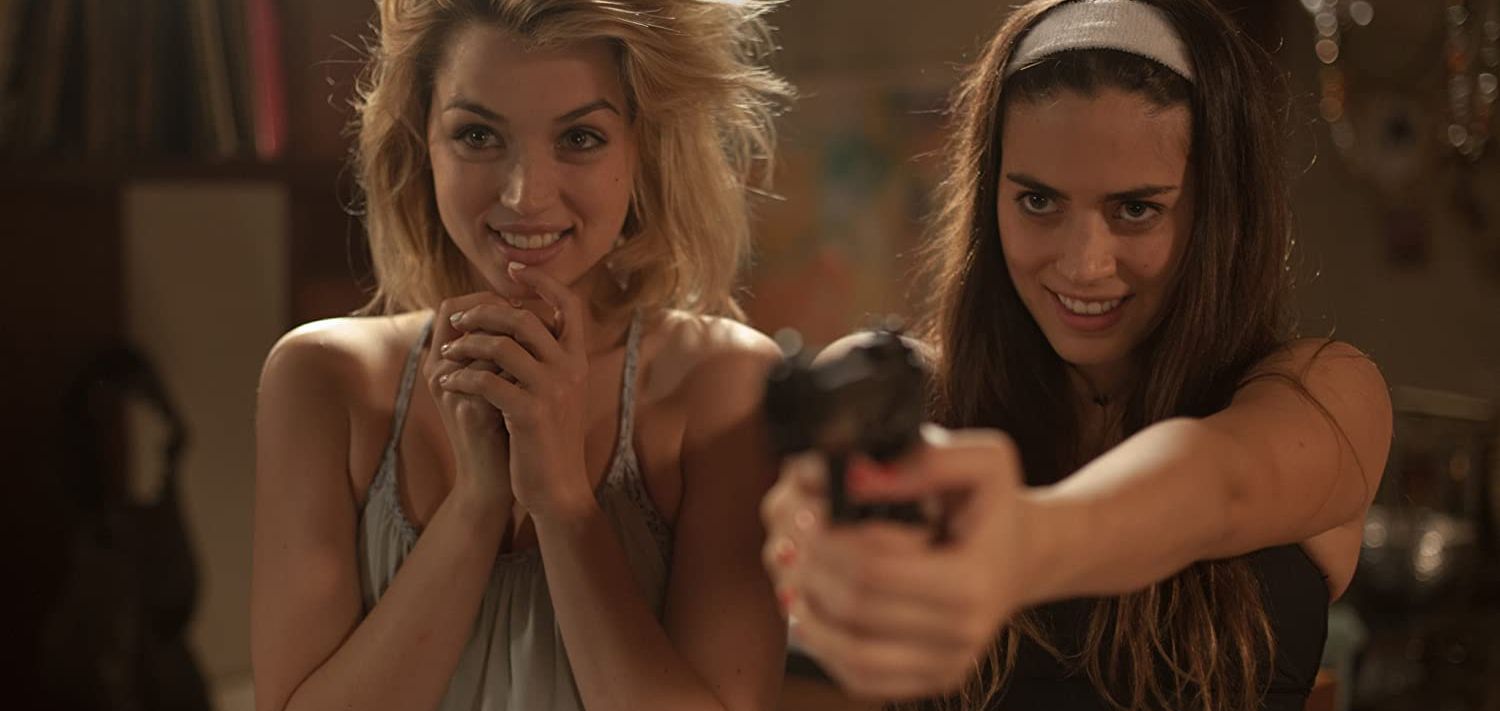★★★½
“Sex ‘n’ drugs ‘n’ cartels rule.”
 There are more famous narconovelas, such as La Reina Del Sur, but you can’t argue with the success of Senora Acero. Surviving for five seasons and a startling 387 episodes in the cut-throat world of Mexican television is no mean feat. Admittedly, there were hardly any characters who lasted the entirety of the show. But such is the nature of organized crime, especially in a show like this. Compared to the first season, it seems like the second helping significantly ramps up the action quotient. It feels like a single episode could not pass, without a car-chase, shoot-out, or at least guns being pointed at each other.
There are more famous narconovelas, such as La Reina Del Sur, but you can’t argue with the success of Senora Acero. Surviving for five seasons and a startling 387 episodes in the cut-throat world of Mexican television is no mean feat. Admittedly, there were hardly any characters who lasted the entirety of the show. But such is the nature of organized crime, especially in a show like this. Compared to the first season, it seems like the second helping significantly ramps up the action quotient. It feels like a single episode could not pass, without a car-chase, shoot-out, or at least guns being pointed at each other.
It begins with Sara Aguilar (Soto), a.k.a. “Senora Acero”, the woman of steel, sitting in prison, where she has been stuck for five years, awaiting formal sentencing [Mexican justice moves slowly, it would appear]. After her son is attacked, she escapes prison in order to help him, but gets caught and ends up back in jail, having been sentenced to a punitive 25 years. This is in part due to the interference of her estranged sister, Berta, who is now the private secretary to the Mexican President, and wields her influence maliciously to punish her sibling. But her best friend, Aracely (Litzy), finds the key to getting Sara’s sentence revoked, and her out of jail.
Life doesn’t exactly become much easier thereafter, as there’s still a state of near-war between the two main drug gangs. There’s the Jalisco cartel, led by Miguel Quintanilla, and Acasio “El Teca” Martínez, of the Tijuana cartel. Sara ends up taking the Jalisco side, stoked largely by her hatred of El Teca, and his chief henchman, “El Indio”, with whom Sara crossed paths in season one. However, that only fuels the fire as Martinez has long held a burning obsession with Sara. His guiding principal appears to be that if he can’t have Sara, nobody can. Sara has no problems using that obsession against him, but it’s a very dangerous game, especially when El Teca realizes he is being manipulated by her.
It also seems to delve significantly deeper into the relationship between the cartels and ‘legitimate’ business and political interests; quotes used advisedly. In this case, the corruption goes right up to the top, with the Mexican president very much in bed with the leader of one group of drug traffickers. Evidence of this connection is a powerful tool, though for obvious reasons, highly dangerous to anyone who possesses it. There is also the head of a major pharmaceutical company, who is using his company’s resources for less legal product; he thinks he can come up with a new drug that will give the high without the dangerous side effects.
The international aspect is well represented too, with another strong female character in Colombian drug lord (drug lady?) Briceida Montero, who seems fairly obviously inspired by Griselda Blanco, about whom we have written previously. There is an effort to involve Chinese traffickers at one point, though this doesn’t go far. On the other side, the DEA are involved. Though their gringo boss is most notable for Chris turning to me and expressing a fervent hope that, as I continue to learn Spanish, I do not sound like him when I speak the language. Mind you, she’s not exactly impressed with the gangster slang used by the likes of El Teca either. I’m clearly going to have to find posher series from which to pick up my diction…
The show does have one particularly memorable supporting character – though not in a good way. Marta Mónica Restrepo, a.k.a. ‘La Tuti’, is a sometime small scale drug dealer, sometime psychic, and always a slut, who also collects dolls. She ends up getting involved with… just about every male character who crosses her path, which makes her subsequent pregnancy resemble a daytime talk-show episode. Manipulative and fickle, she is easily our most “love to hate” character. Not just in the show, or narconovelas generally, but perhaps the history of our TV viewing. I suspect it’s entirely deliberate, so much credit to the writers, and actress Ana Lucía Domínguez, for making it so.
 There’s another aspect we found more genuinely enjoyable. El Teca finds himself a doppelganger, in the form of an immigrant worker from Colombia. Also kidnapping the man’s wife and daughter for leverage, his double is used to fool both the authorities in the Jalisco cartel. While the technical aspects for the depiction of El Teca and his twin are primitive – it’s mostly shooting from behind the shoulder, with an obvious stand-in – the characters are so utterly different, it’s often difficult to believe the same actor is playing both parts. Again, credit where it’s due, to José Luis Reséndez, for bringing both men to life with his performance.
There’s another aspect we found more genuinely enjoyable. El Teca finds himself a doppelganger, in the form of an immigrant worker from Colombia. Also kidnapping the man’s wife and daughter for leverage, his double is used to fool both the authorities in the Jalisco cartel. While the technical aspects for the depiction of El Teca and his twin are primitive – it’s mostly shooting from behind the shoulder, with an obvious stand-in – the characters are so utterly different, it’s often difficult to believe the same actor is playing both parts. Again, credit where it’s due, to José Luis Reséndez, for bringing both men to life with his performance.
It is, however, Sara Aguilar’s show, and she is the Sun around which all the other bodies revolve, in their elliptical subplots (some of which I could have done without, such as that about one character’s dreams of musical stardom). Much like Teresa Mendoza in Queen of the South, it’s Sara’s fierce loyalty to those on her side which is her most defining characteristic. She’ll got through hell for them, including her son, even after he has been turned into a junkie by her enemies. Needless to say, that’s an act which will not go unpunished. The ending proves quite satisfactory in this area, although also has the kind of cliffhanger, with Sara apparently badly wounded, that will only be resolved in series three.
Despite the tease at the end of the opening credits, with Sara wielding a large, automatic weapon, and quite a lot of heavily-armed arguments, she isn’t quite as personally involved as I might have hoped. Still, I guess delegation is a significant part of being a good leader, isn’t it? This was certainly enjoyed, and became a staple of morning entertainment for me, over several months. I think Chris was even getting into it more than she’d admit, as she drifted through and got ready for work. It may be a while before I have the stamina to start the next season, however. For there’s ninety-three episodes in that…
Creator: Roberto Stopello
Star: Blanca Soto, Litzy, José Luis Reséndez, Lincoln Palomeque
 For the first hour, you may be forgiven for wondering if there has been some kind of mistake, because the poster bears almost no resemblance to what happens in the film. Oh, it’s the same actress, to be sure, and she is a schoolgirl. But it appears, rather than the war story promised, you have strayed into a teenage drama. In it, Ai (Seino) is a talented but troubled student, who seems to be suffering from some kind of post-traumatic stress disorder. The special treatment she receives at school brings her enmity as a result, both from her class-mates and the er homeroom teacher (Kaneko). Though she finds solace in art, including a mysterious major project on which she is working, housed in the school auditorium.
For the first hour, you may be forgiven for wondering if there has been some kind of mistake, because the poster bears almost no resemblance to what happens in the film. Oh, it’s the same actress, to be sure, and she is a schoolgirl. But it appears, rather than the war story promised, you have strayed into a teenage drama. In it, Ai (Seino) is a talented but troubled student, who seems to be suffering from some kind of post-traumatic stress disorder. The special treatment she receives at school brings her enmity as a result, both from her class-mates and the er homeroom teacher (Kaneko). Though she finds solace in art, including a mysterious major project on which she is working, housed in the school auditorium.




 Made on a shoestring in Ireland, the nicest thing you can say is probably, this doesn’t look as cheap as it was. If only you could say the same for the script, which seems to be trying to be Guy Ritchie, only to end up nearer to Guy Fieri. It’s not a terrible idea, if rather stretching belief. Katelin Ballantine (Doherty) is a film producer, trying to raise funds for her latest movie. To that end, she is hanging out, unwillingly, with sleazeball businessman, Felim Shaw. What she doesn’t know, is he is deep in debt to local mob-boss Edmund Murren (Fleming). He kidnaps them both, forces Katelin to kill her potential investor, then threatens her family to make her continue in her new career as his assassin, alongside former friend and now Murren associate, Henry Furey (Kealy).
Made on a shoestring in Ireland, the nicest thing you can say is probably, this doesn’t look as cheap as it was. If only you could say the same for the script, which seems to be trying to be Guy Ritchie, only to end up nearer to Guy Fieri. It’s not a terrible idea, if rather stretching belief. Katelin Ballantine (Doherty) is a film producer, trying to raise funds for her latest movie. To that end, she is hanging out, unwillingly, with sleazeball businessman, Felim Shaw. What she doesn’t know, is he is deep in debt to local mob-boss Edmund Murren (Fleming). He kidnaps them both, forces Katelin to kill her potential investor, then threatens her family to make her continue in her new career as his assassin, alongside former friend and now Murren associate, Henry Furey (Kealy). I’ve no problem per se with faith-based cinema. My main issue is that they tend to be, literally, preaching to the converted, and if you’re not already on board, they tend not to work, purely from a cinematic perspective. There are exceptions:
I’ve no problem per se with faith-based cinema. My main issue is that they tend to be, literally, preaching to the converted, and if you’re not already on board, they tend not to work, purely from a cinematic perspective. There are exceptions: 

 This is the kind of film which makes for very uncomfortable date night viewing, simply because the situation presented is likely to lead to awkward conversations. Happily married architect Evan Webber (Reeves) has the house to himself for the weekend, his wife having gone with their two kids to the seaside, leaving him free to work on a project. A stormy night ensues, until a knock at the door, and he finds two lost young women, Genesis (Izzo) and Bel (de Armas), shivering on the doorstep. He can hardly make them stay there, so lets them in. Almost immediately, something is wrong, though initially this falls into the “Too good to be true” category. For they are nymphomaniac flight attendants, and inevitably – though after a credible struggle – Evan succumbs to their relentless charms.
This is the kind of film which makes for very uncomfortable date night viewing, simply because the situation presented is likely to lead to awkward conversations. Happily married architect Evan Webber (Reeves) has the house to himself for the weekend, his wife having gone with their two kids to the seaside, leaving him free to work on a project. A stormy night ensues, until a knock at the door, and he finds two lost young women, Genesis (Izzo) and Bel (de Armas), shivering on the doorstep. He can hardly make them stay there, so lets them in. Almost immediately, something is wrong, though initially this falls into the “Too good to be true” category. For they are nymphomaniac flight attendants, and inevitably – though after a credible struggle – Evan succumbs to their relentless charms. This falls victim to the Spielberg Effect. By that, I mean, that any movie directed by Steven Spielberg will inevitably become the yardstick by which future entries of that kind are judged – typically, unfavourably. Killer shark films will be compared to Jaws. Holocaust epics to Schindler’s List. And the genre of movies in which drivers are menaced by unseen truck drivers? Expect comparisons to Duel. And in this case, they are entirely warranted. I guess if you’ve never heard of Duel, this might just pass muster. But you would still be better off watching it, than this lame imitation, which has a nice car (a Mustang) and some lovely scenery (I’m guessing Canadian). That’s all it can offer though.
This falls victim to the Spielberg Effect. By that, I mean, that any movie directed by Steven Spielberg will inevitably become the yardstick by which future entries of that kind are judged – typically, unfavourably. Killer shark films will be compared to Jaws. Holocaust epics to Schindler’s List. And the genre of movies in which drivers are menaced by unseen truck drivers? Expect comparisons to Duel. And in this case, they are entirely warranted. I guess if you’ve never heard of Duel, this might just pass muster. But you would still be better off watching it, than this lame imitation, which has a nice car (a Mustang) and some lovely scenery (I’m guessing Canadian). That’s all it can offer though. While initially released as a film, what’s reviewed here is the extended cut, screened as four 45-minute episodes on Russia’s Channel One in May 2016. This is easily available, on both Amazon Prime and
While initially released as a film, what’s reviewed here is the extended cut, screened as four 45-minute episodes on Russia’s Channel One in May 2016. This is easily available, on both Amazon Prime and  Not unlike the saga of
Not unlike the saga of  Ella (Daly) is a shy college student, whose psychology lecturer gives the class an unusual project: break a sexual norm. Unfortunately, Ella is rather confused about the intersection between sex and violence, in part because of genetics, for her father was a serial killer, before abandoning her pregnant mother (Heinrich). As a result, Ella’s attempt to carry out the assignment by auditioning at a strip-club, ends with her slitting the throat of the owner (Ron Jeremy, being appropriately grubby). This awakens the serial killer dormant inside her, and she starts taking out the sleazy men around her. The problem is nice guy Daniel (Andres), whose unwillingness to match her stereotypical opinions of masculinity, triggers further conflicting feelings in Ella, as her acts of murder become increasingly more blatant.
Ella (Daly) is a shy college student, whose psychology lecturer gives the class an unusual project: break a sexual norm. Unfortunately, Ella is rather confused about the intersection between sex and violence, in part because of genetics, for her father was a serial killer, before abandoning her pregnant mother (Heinrich). As a result, Ella’s attempt to carry out the assignment by auditioning at a strip-club, ends with her slitting the throat of the owner (Ron Jeremy, being appropriately grubby). This awakens the serial killer dormant inside her, and she starts taking out the sleazy men around her. The problem is nice guy Daniel (Andres), whose unwillingness to match her stereotypical opinions of masculinity, triggers further conflicting feelings in Ella, as her acts of murder become increasingly more blatant. The German-Canadian co-production is split into two feature-length parts – “Dragonfly” and “Energy” – but is absolutely a single entity, so that’s how it’ll be covered here. I was braced for something truly dreadful, after reading some particularly scathing reviews, and seeing no less than
The German-Canadian co-production is split into two feature-length parts – “Dragonfly” and “Energy” – but is absolutely a single entity, so that’s how it’ll be covered here. I was braced for something truly dreadful, after reading some particularly scathing reviews, and seeing no less than